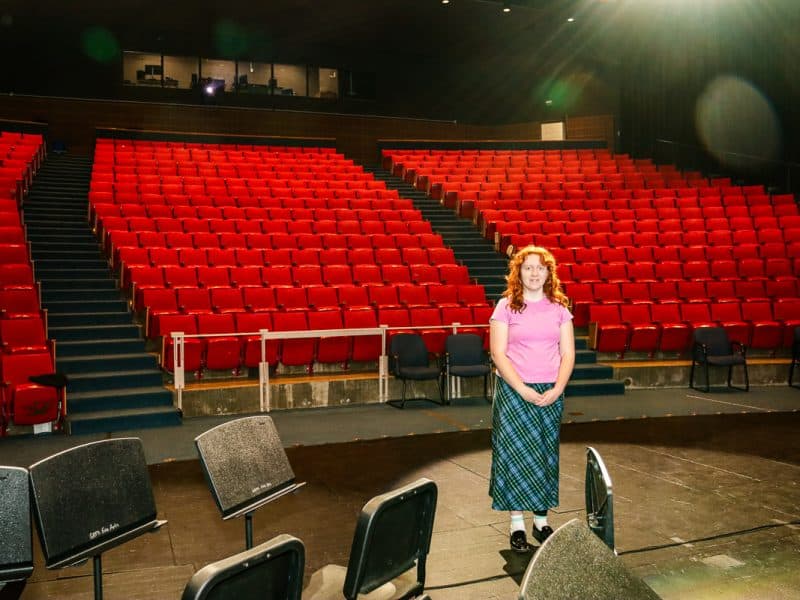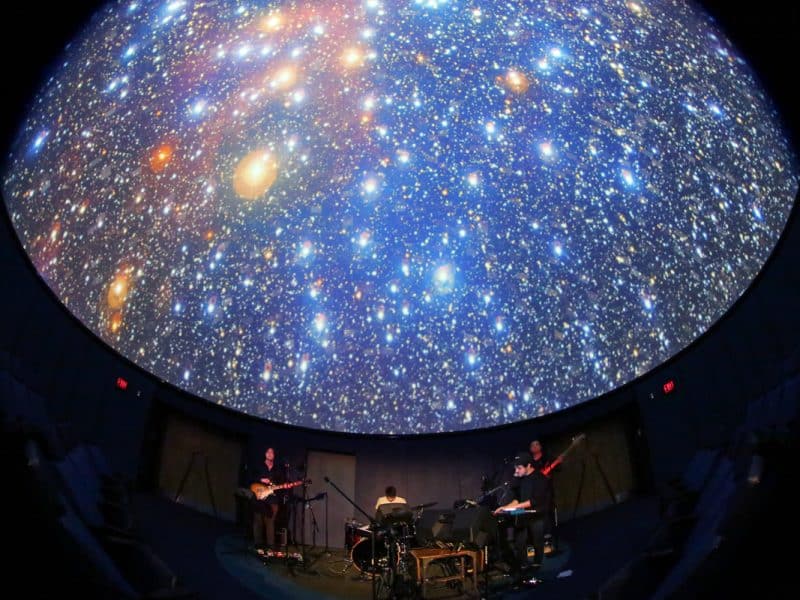Where everybody knows your name: How Muskegon’s downtown bars and breweries are building the city
In just a couple years, downtown Muskegon has done a complete 180. Where once there were empty streets and abandoned buildings, there's now a thriving commercial landscape. The local brewery and bar scene has played a major role in this transformation, and the city's watering holes are continuing to reshape the city and its economy.
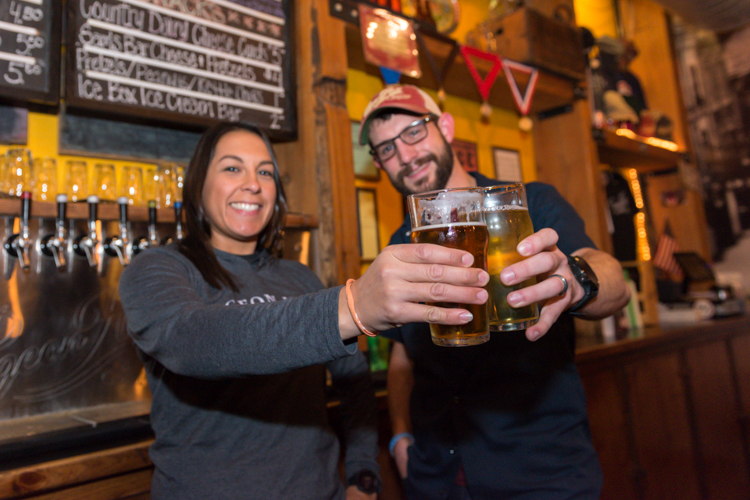
At first, everyone told them they were crazy.
You’re going to open a brewery in downtown Muskegon? But no one goes there, they’d say. How are you going to make it?
“When we started building up this taproom, everyone said we were crazy for coming downtown, and I said, ‘No, we believe in this,’” says Michael Brower, who, along with Joel Kamp and Chad Doane, owns Pigeon Hill Brewing Company. “We’d be sitting here at 9 p.m. on a Friday night, building tables and looking out the window, and there was nobody. It was terrifying.
“And now? Last Friday I had to park three blocks away,” Brower continues. “People were everywhere. It’s incredible what’s happened here in such a short timespan.”
Pigeon Hill opened at 500 Western Ave. in March 2014, not long after Muskegon’s first craft beer outlet, Unruly Brewing Co., debuted in Western Avenue’s recently renovated Russell Block building at the end of November in 2013. The two outlets have become part of a quickly growing downtown Muskegon—a place that has gone from having blocks of unpaved roads and empty buildings following the demise of the Muskegon Mall in 2001 to becoming a thriving hub of restaurants, shops, and new and incoming apartments.
“There was nothing else open on our end of town when we started; there were actual tumbleweeds going down Western Avenue,” says Eric Hoffman, Unruly Brewing’s brewmaster and co-owner.
“Now, there’s a six-story building going up across the street from us,” Unruly Brewing co-owner Jeff Jacobson says, referring to the commercial and residential structure being built at 351 Western Avenue. “Now, it’s becoming an entertainment district. The retail needs to fill in, but that’s coming. There are concerts happening here. It’s changed the way people look at downtown.”
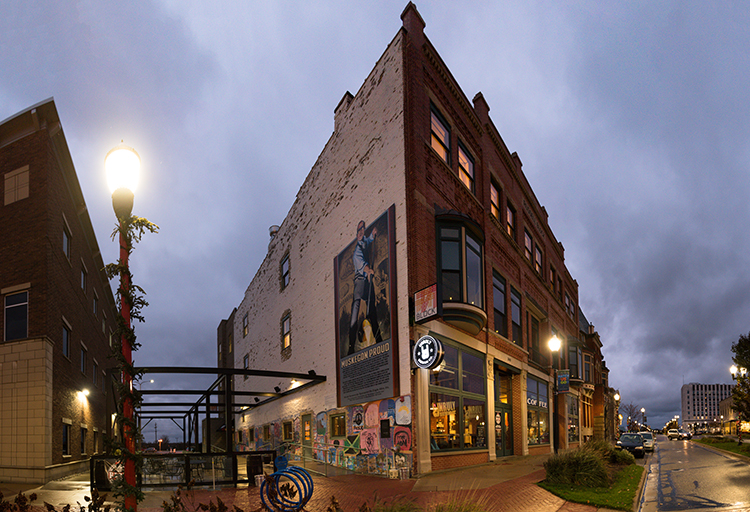
Downtown Muskegon hadn’t always been the ghost town that the business owners describe, and, for decades, it was the pulse of the city, a commercial center that grew as the lumber industry reigned supreme in the area in the late 1800s and continued to expand throughout the first half of the 20th century. Downtown streets were lined with often ornate buildings constructed in the second half of the 1800s and early 1900s, including the iconic eight-story Occidental Hotel, the centerpiece of Western Avenue and Third Street for more than a century; the Flatiron building, a landmark that stood at Western Avenue and Market Street; and the Century Club, a social club frequented by city millionaires, such as lumber baron and philanthropist Charles Hackley and John Torrent, a lumber baron who served as Muskegon’s mayor for three terms.
For decades, downtown was the site of parades and community celebrations, and it drew people from throughout the region to its events, restaurants, and shops. But, as the years went by, Muskegon’s downtown struggled as the city faced a nationwide recession that hit Muskegon County particularly hard; in the late 1970s and early 1980s, the county faced a jobless rate hovering around 20 percent. To rejuvenate a sinking economy, the city razed much of the downtown, including the Occidental Hotel and the Flatiron building, and replaced its historic structures with the Muskegon Mall, a vast indoor shopping complex that opened in 1976 and covered eight downtown blocks spanning 23 acres. While the venture served as a major commercial hub for years, it eventually shuttered in December 2001 following the opening of The Lakes Mall in Fruitport Township. By the time the Muskegon Mall closed, almost all of the retail had departed the downtown area, leaving in its wake abandoned buildings and a nonexistent street system where the mall once stood.
But that has changed—and dramatically. Since the mall’s closure, more than $200 million has been invested in downtown Muskegon, and Western Avenue has gone from being an unpaved road to the home of a string of new establishments, from Pigeon Hill and Unruly Brewing to 18th Amendment, the boutique shops inside the Century Club Retail Center, and the Red Lotus Art Gallery, also inside the Century Club. The Frauenthal Center on Western Avenue is drawing nationally acclaimed acts, Baker College’s Culinary Institute of Michigan is helping to transform the area’s culinary landscape, about 175 residential units are being built downtown, Muskegon Community College has opened its downtown campus, KL Outdoor (the largest kayak manufacturer in the world) is opening its headquarters downtown, and a $15 million convention center is poised to open next to the L.C. Walker Arena.
All of which is to say: there are no more tumbleweeds floating down empty streets in downtown Muskegon.
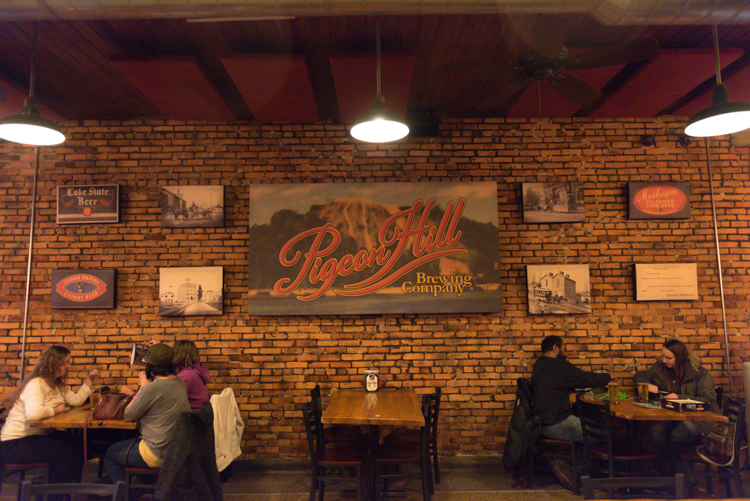
“I love the things that are happening here,” Brower says. “The other night, I was walking back from Smash Wine Bar back here [to Pigeon Hill]. It was eight o’clock at night on a Tuesday, and it was busy. Looking around, you could feel what was happening. You see the lights, the sense of holiday cheer coming back; you see the people walking around on a Tuesday night when the weather wasn’t great. It felt like a town where things are happening. It feels like a great place to be.”
As any of downtown’s brewery and bar owners will tell you, the reasons for Muskegon to raise its collective glass right now are numerous: an increasingly successful commercial landscape that’s being driven by area residents themselves, the fact that those who left the city are returning home to open businesses, a Muskegon that is rising.
So, where are the places to raise said glass, both proverbially and literally? The city is fortunate to have a growing bar and brewery scene that’s creating jobs and pumping money into the region. The downtown’s watering holes are a testament to the strength of the city themselves, from the breweries helping to jumpstart a local economy that is now being noticed throughout the state, and beyond, to longtime establishments that have weathered an economic roller coaster and provided a warm and welcome space for residents in search of a friendly face.
These are the places that are microcosms of Muskegon itself: tight-knit communities filled with individuals from all walks of life, spaces that are overflowing with music and history and toasts to the power of people coming together, linking arms, and dancing into the night.
Unruly Brewing: Ushering in Muskegon’s era of craft brewing
Almost exactly four years ago, on the day before Thanksgiving in 2013, Unruly Brewing opened its doors, marking the beginning of craft brewing in the city—and a new chapter for Muskegon’s downtown as a whole. More than 700 people attended that opening event, raising their glasses to the first beer brewing in downtown Muskegon since 1957, when operations ended at the Muskegon Brewing Company building, now the home of Cole’s Quality Foods.
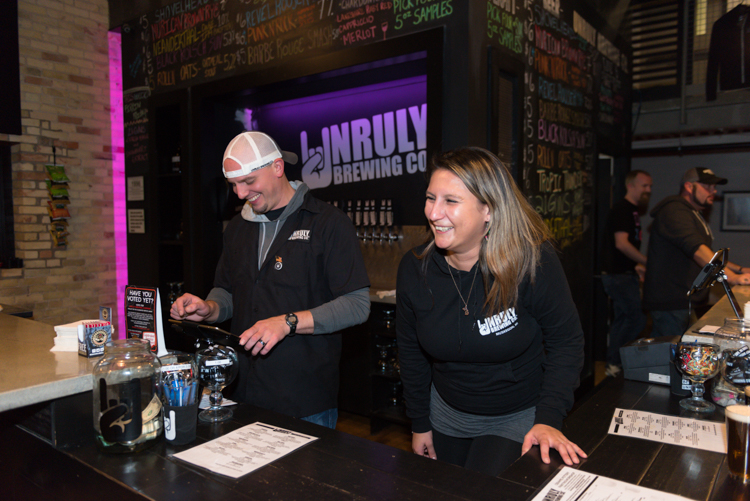
When Jacobson, who grew up in Norton Shores and works as a business attorney based in Muskegon; Hoffman, who grew up in North Muskegon; and the brewery’s third co-owner, Mark Gongalski, decided to follow their dreams and open a brewery, they heard downtown calling their name.
“There was a desire to be downtown, but the buildings were a wreck,” Jacobson says on a recent Wednesday evening, when Unruly is filled with everyone from businessmen wrapping up meetings to residents who biked over from their homes in the nearby Watermark Lofts.
“When we found this space, we knew it was a fit,” Jacobson continues, referring to the Russell Block building that was built in 1890 and had served as office space for lumber barons Charles Hackley and Thomas Hume, as a Post Office, and, ultimately, as Daniel’s Office Supplies in the Muskegon Mall. Muskegon developer Gary Post purchased the Russell Block building, along with the two historic buildings next to it, the Century Club and the old Savings Bank site, which is now 18th Amendment, in 2006, and the Russell Block space has since turned into the home of Unruly, Drip Drop Drink, and Rebel Pies.
Muskegon Community Foundation from Hendrickson Video on Vimeo.
Since it opened four years ago, the brewery has quickly taken off, becoming a community gathering space for everyone from owners and employees at downtown businesses to city officials and area musicians, who regularly play at the venue.
“We get a lot of business meetings here; it’s become a community center,” Jacobson says. “I mean, ideas go good with beer. We have people come in and say, ‘I feel like we should be paying rent’ because they’re here so often.”
When it comes to the beer itself, they range from the always popular ‘Murican Brown Rye, an American brown ale, to the Shovelhead, a pre-Prohibition style cream ale named after the classic motorcycle engine, and a whole lot more. Whether it’s beer using coffee from Drip Drop Drink (named Drip Drop Drunk) or a brew called the Snurfer that commemorated the 50th anniversary of the original snowboard (made right here in Muskegon), the drinks have been lauded by beer aficionados throughout the region.
“A lot of the beers we brew we’ve been brewing forever; some go back to when I was home brewing,” says Hoffman, who, prior to opening Unruly went to school for engineering, home brewed for about five years, and was the author of a food blog. “For the most part, we brew on the bolder edge of flavors, as far as the hops we use in our IPAs or the roast malts in a stout. Everything’s a little notch up; that’s the style I like.”
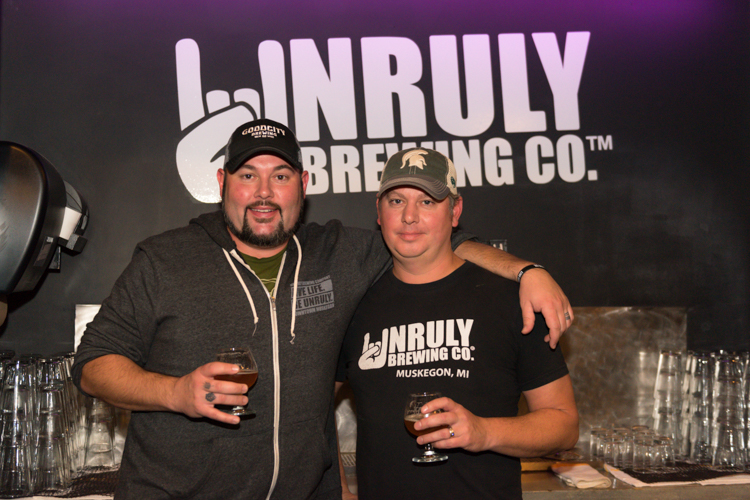
As for what seems to be a favorite at Unruly? It’s gotta be 21 Guns, a hoppy wheat beer, the owners agree.
“We tell everyone 21 Guns is the best beer in America,” Jacobson says, noting that Unruly is now developing a production facility in Muskegon with the goal of distributing their beer and opening future taprooms.
The space too has firmly rooted itself in the city’s burgeoning music scene, joining such venues as The Frauenthal Center, situated down the street from Unruly, and The Block, located just above the brewery. Becoming a favorite for live music in the area, with the brewery drawing musicians from Muskegon and Detroit to New York and Nashville, Unruly also has an eclectic roster of events, including retro video game nights and stand-up comedians.
“We want to be a venue that gets music from all over the country,” Jacobson says. “With the music, my goal is to pull people from Grand Rapids and elsewhere and get our music listened to and reviewed. I want people to say, ‘Let’s go to Muskegon for the night.’”
Rooted in Muskegon history, Pigeon Hill is shaping the city’s future
Once a massive sand dune towering a couple hundred feet (217 feet, to be exact—a number determined by a Muskegon High School trigonometry class in 1907) above the western shores of Muskegon Lake, Pigeon Hill was an iconic attraction that drew tourists from across Michigan in the late 1800s and early 1900s. Named for the thousands of passenger pigeons that would congregate around the dune’s peak, Pigeon Hill was a major point of pride for the Muskegon community. However, the sand dune was sold in the early 1920s, and mining operations began there in 1926. By 1938, the dune—the result of an incredible history that spans to a time when continental glaciers covered the Michigan landscape for more than a million years, providing the major source for the sand and other sediments that, after centuries of being blown by the wind, became Muskegon’s dunes—had been reduced to a series of sandy bumps.
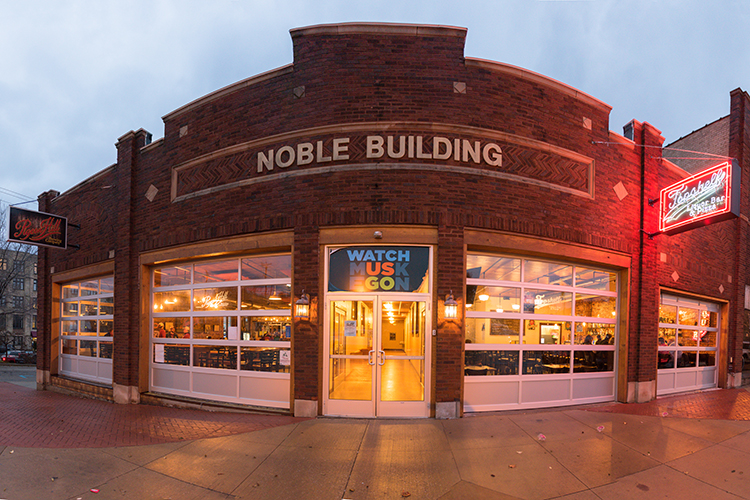
Close to nine decades after the mining of the dune began, there is a Pigeon Hill in Muskegon, and, once again, it has become a source of pride for the community. Pigeon Hill Brewing Company, named for the iconic dune, opened in March 2014, and the thriving business is an homage to both the city’s history and its future. Boasting a bar constructed with black walnut that was harvested and milled in Muskegon, the brewery also has table tops made from white pine that was cut down in the 1880s, the heyday of Muskegon’s logging industry, sent to a saw mill that has since become the Great Lakes Marina, and ultimately dredged up using federal grant money. Taking a glance around the taproom, visitors will see everything from a 55-foot mural of a historic Western Avenue [see an interactive version of the mural here] to bottles from the Muskegon Brewing Company, the city’s original brewery that opened in 1876 and was long regarded as the best brewing company in the Midwest.
In other words, Pigeon Hill Brewing Company is a space that tells the story of its city: of industry, of the depletion—and restoration—of natural resources, of the people who have ridden the ups and downs of economies that have soared and plummeted. It is the story of the brewery’s owners, who saw their downtown crumble, had seen its empty, post-mall streets, and knew they wanted to be a part of its revitalization.
“I’m young, so I don’t remember the mall going up or the old downtown, but I remember a mall that was OK,” says Brower, who grew up in Muskegon, left to attend law school in Chicago, and returned to the city with his wife, Alana, who now manages the taproom, in 2011. “I was never overly excited to go there, but it was a trip. Then, it became deserted, and then it was torn down and became all sand.”
At that point, the city knew struggle, but it certainly wasn’t ready to give into defeat, Brower says.
“We were ready. I don’t think anyone knew what we were ready for, but we were ready,” he says. “The new Chamber building came to downtown. There was the rebuilding of Russell Block and the Century Club. People started doing things down here. In Muskegon, we’re resilient people. In Muskegon, we take care of our own; that defines us.
“We’ve been through some really rough patches, but we started as a rough-and-tumble town willing to pull itself up by its bootstraps,” Brower continues. “We’re not going to give up, on each other or on the town.”
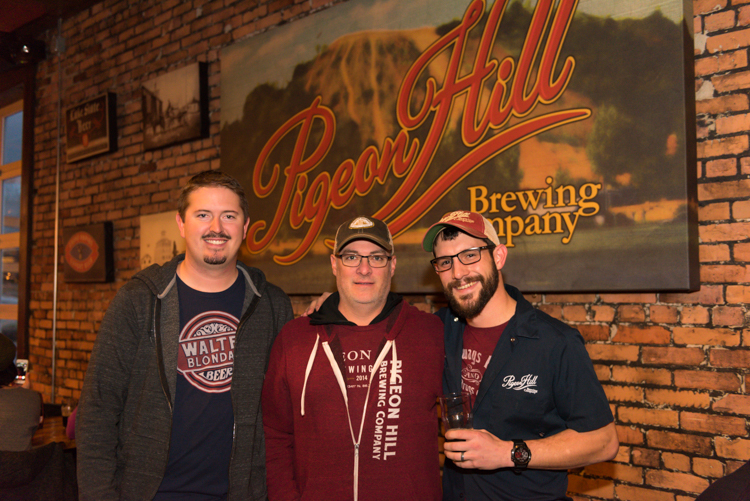
It is that sentiment that inspired Brower, Kamp, and Doane to open Pigeon Hill downtown—and the business has skyrocketed with a kind of success that has left even its owners surprised.
“We opened as three guys who had hopes and dreams; we never thought we’d be where we are this quickly,” Brower says. “We were trying to make our own beer, make people excited about Muskegon products, revitalize downtown. We were a couple boys trying to do right, and now we’re doing statewide distribution in about 880 locations across Michigan.”
In fact, things are going so well at Pigeon Hill that Brower was able to “retire from practicing law at 30 years old” last June and work at the brewery full time—and he and the two other co-owners are now in the process of unrolling a $2.5 million multi-phase expansion plan. The first phase includes building a 15,000 square foot multi-use building at Fourth Street and Shoreline Drive; the space will include a 12,000 square foot production facility, room for brewery tours, offices, and a small retail component. The second phase will be the construction of a two-story taproom at 441 Western Ave., the site of Pigeon Hill’s current production facility.
“One of the biggest things that drives us, and has driven us since day one, is our belief in community,” Brower says. “The success of our business undeniably comes from the support of our community. The more we all believe in our community, the more we’re all going to rise up.”
Mike’s Inn: ‘One of the greatest hole-in-the-wall-bars you’ll ever go into’
Before there was Pigeon Hill, or Unruly, or 18th Amendment—before any of the breweries and bars that now populate Western Avenue—there was Mike’s Inn, a community mainstay born in 1955. A place of pool games and Coors Light posters, a world where the jukebox doesn’t stop, a land where Fireball and Jameson flow freely, Mike’s is an unpretentious space filled with decades of stories of the people who call Muskegon home. It is, Dawn Ingalls, a bartender known as “Mama Dawn” by many of her patrons, will tell you, the “last honky-tonk bar left in Muskegon.”

“It’s one of the greatest hole-in-the-wall bars you’ll ever go into,” says Ingalls, whose brother-in-law, Bill “The Rooster” Ingalls, owns Mike’s, which originally opened in the space that’s now the Muskegon Heritage Museum and moved to its current home in 1980 after a fire destroyed its first building.
Walk into Mike’s Inn at 555 Western Ave. at pretty much any time, and you’ll find someone to laugh and cry with, someone to drown your sorrows with, someone to raise a glass to an engagement or wedding or new job with. You will, Ingalls explains, find a family.
“When anyone is hurting, we try to do something to help them,” says Ingalls, who was born and raised in Muskegon. “There’s been quite a few benefits for people who’ve needed help here. We’re here for everyone, from weddings to saying goodbye to a close friend in death.”
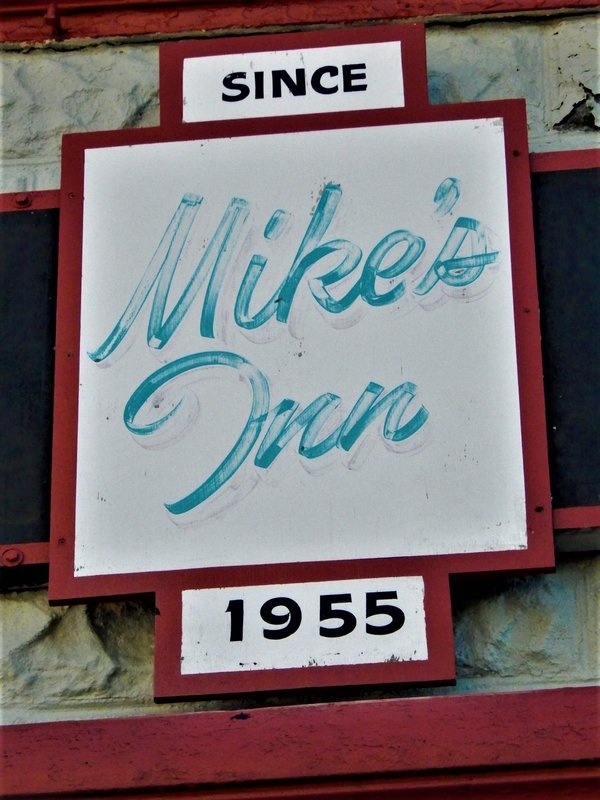
Genuinely, Mike’s is a place where everybody knows you, or will get to know you. Customers will heap praise on the bartenders they know by name, as well as on the fellow patrons they’ve sat next to at the wooden bar for years. At Mike’s, there’s a crowd populated by familiar faces and new ones alike. People like Jim Dinger, Mike’s previous owner, would come in every day until a couple years ago; the bartenders, many of whom have been there for years, if not decades, know their customers’ histories, their loves, their heartbreaks. Linda Haas, who worked at Mike’s from 1985 to 2012, got on the phone with Ingalls during our interview and, truly, could tell you almost anything you wanted to know about the bar: when it was built, when it moved out of its original location, what existed in the building before (Olson’s Shoe Store), about the people who have come in and out of its doors for years.
From its perch on Western Avenue, Mike’s Inn has, for a little more than 60 years, seen a downtown that has been lined with historic buildings to one dominated by the Muskegon Mall to a space of empty roads and abandoned buildings. Now, Ingalls says, she’s thrilled to see it bustling once more.
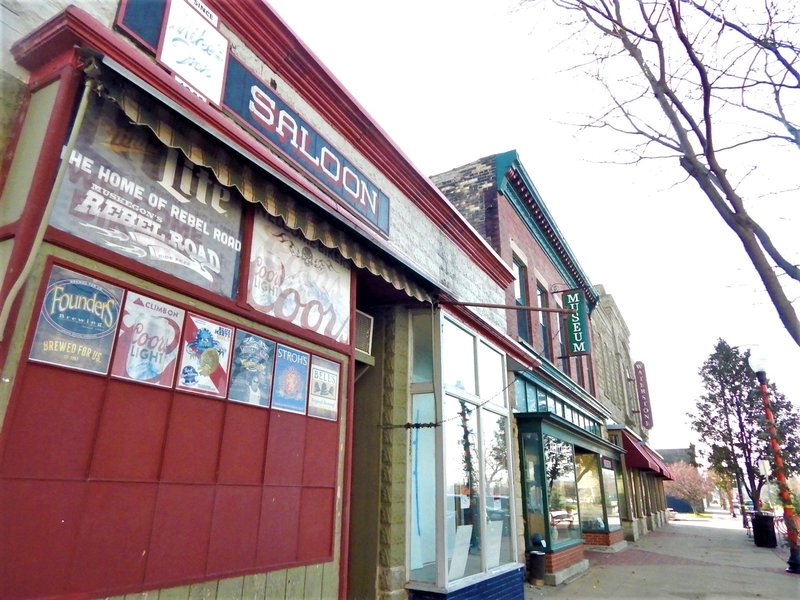
“We were really excited when the breweries came in,” she says. “I love the saying, ‘Watch us go.’ We have a couple breweries now, a distillery. There’s a lot happening, and all of the bars work together. Racquets will host a crawl, but it will benefit all of us. We all benefit from the growth that’s happening here.”
Topshelf Liquor Bar & Pizza: A business owner expands downtown
After operating the Topshelf Pizza & Pub on Apple Avenue in Muskegon for about a quarter of a century, owner Jim Noel decided it was time to expand and set his sights on a downtown location. In December 2014, Noel opened his second Topshelf location, Topshelf Liquor Bar & Pizza, next to Pigeon Hill in the historic Noble Building.

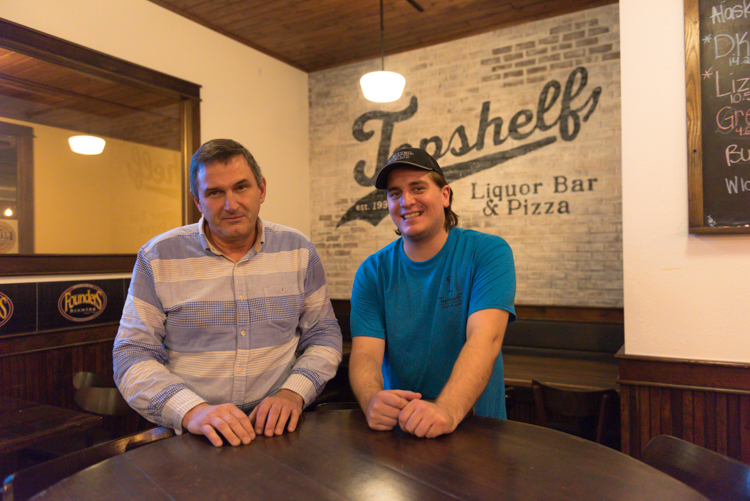
“One of the things that excites me in the downtown area are the opportunities that are there and that will become available,” says Noel, who’s hoping to open another restaurant, potentially a retro 1920s Chicago-style pizzeria, in the downtown area.
Like business owners throughout the downtown, Noel notes that he’s been thrilled by the camaraderie he has seen among area establishments, noting he has a strong relationship with Pigeon Hill. The two businesses are linked by an adjoining hallway, and during the summer months they both offer open air seating, easily allowing patrons to move between the two spaces.
“We have a great relationship with Pigeon Hill,” says Noel, who grew up in Muskegon and then lived in Baltimore, Philadelphia, and Chicago before moving back to the city in 1990. “We serve food next door, and people will come in, order food, and then go next door and eat it. It’s been wonderful.”
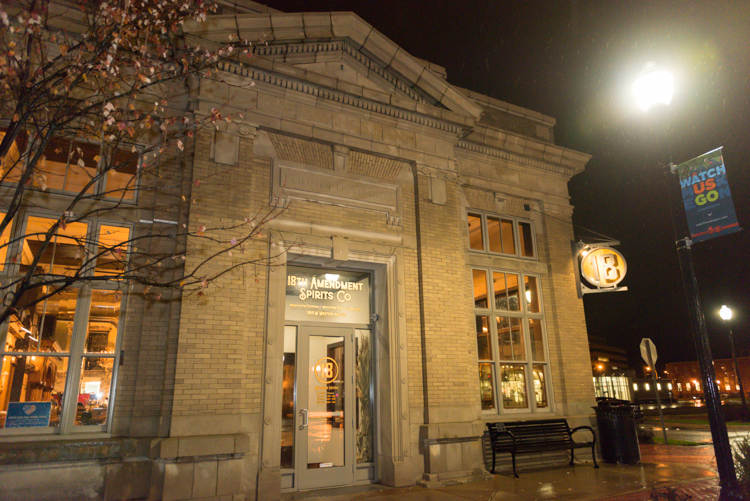
Cocktails and community: 18th Amendment becomes a drinks destination
One of the newest establishments to join the downtown, 18th Amendment debuted in April 2017, and like its neighboring businesses, has taken off.
The first distillery to open in Muskegon in decades, 18th Amendment, named for the Constitutional amendment that resulted in Prohibition, is located in the old Savings Bank on Western Avenue—a historic space built in 1887 that easily lends itself to the restaurant’s speakeasy feel. [Take note, history buffs: the restaurant is filled with Muskegon’s past, including a Chase Hackley piano made in the Muskegon factory that was recently torn down to make way for the incoming Windward Pointe development and a massive wooden bar built by the Brunswick company in Muskegon in the late 1800s. Plus, its “Nickel Caper” drink was inspired by three robbers who shimmied down the Muskegon Savings Bank’s coal shoot, tunneled through the cement into the bank’s vault, and stole $220 in nickels—a little more than $5,640 in today’s money. Ultimately, the three confessed and were imprisoned.]
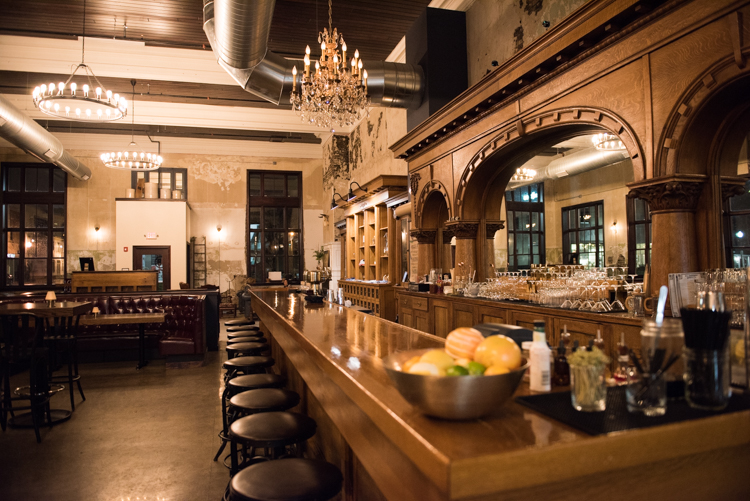
After purchasing the Savings Bank building from Gary Post, 18th Amendment owners Logan Pitts; Mark Fellwock, the head distiller; and Mark Moulton conducted extensive work on the building, which, at the time they purchased it, was surrounded by a number of vacant buildings. Now, “there’s no property left,” Pitts says of the rapidly expanding downtown. By the time the distillery was ready to open, its impending debut was highly anticipated; the community—both the customers and the employees—overwhelmingly embraced it.
“We had people who worked and slept here overnight because they were working to three, four in the morning,” Pitts says of the time around 18th Amendment’s debut. “When we opened, there was a line out the door and down the street.”
“The response has been amazing,” Fellwock says. “We’re pulling in people from Grand Rapids, from Detroit, who come to see us.”
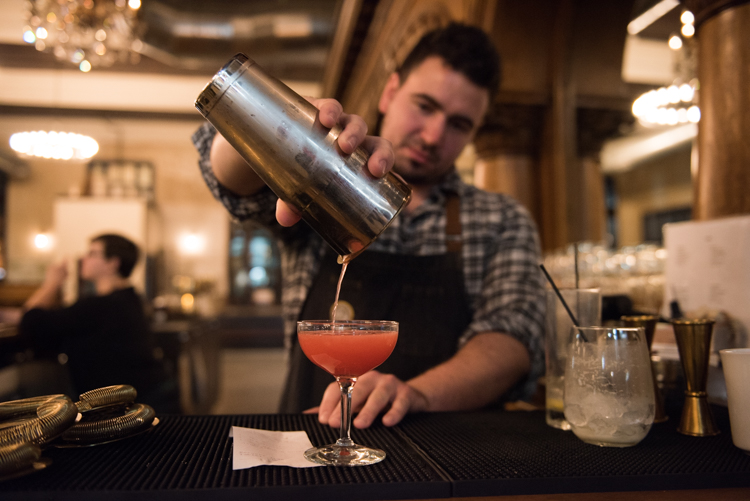

Pitts too notes that customers come from cities throughout Michigan.
“You meet people sitting at the bar from Detroit, and people tell me they’ve come to see Muskegon,” Pitts says. “We have a progressive, new, youthful spirit with downtown Muskegon; we have the ‘Watch Muskegon’ campaign, which has worked very well and brought people here; the city manager, Frank Peterson, has done a phenomenal job.”
Just months after opening, the distillery is growing. Recently, it expanded its lunch and dinner menus and began offering brunch, and 18th Amendment has kicked off statewide distribution. The Muskegon distillery makes vodka, rum, gin, and whiskey, which they use in an almost dizzying array of hand-crafted cocktails.
“As of next summer, we’re looking at off-site production, to have our own production facility, and to sell across the country,” says Fellwock, who notes that the craft distillery industry is quickly following in the footsteps of a craft brewing scene that has exploded in West Michigan, as well as across the country. There are about 30 craft distillers in Michigan, and it’s an industry that’s poised to take off in the Mitten State, particularly considering Michigan is the second largest agricultural state in the country (the first is California).
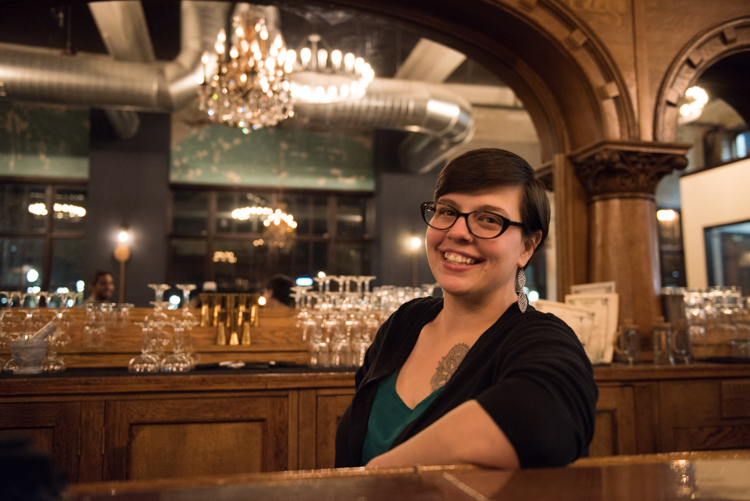
Additionally, the venue is expanding its entertainment and culinary education options, offering cocktail classes from General Manager Jo Glover, jazz ensembles, and even a Gatsby-style New Year’s Eve party.
All of this—the renovated Savings Bank space, furniture made by Muskegon residents at the turn of the 20th century, acclaimed food and drink, and an ever-growing roster of events—translates to a community’s palpable excitement surrounding 18th Amendment and the growth it represents, Glover says.
“When I moved here 16 years ago, there was nothing down here,” she says. “To see it grow is exciting; I’m lucky and grateful to be a part of it.”
At Racquets Downtown Grill, a place for everyone
After being born and raised in North Muskegon, Ron Madison, the owner of Racquets Downtown Grill at 446 Western Ave., left home to travel the world. The former Reeths-Puffer High School football state champion lifted weights for the U.S. in competitions across Europe, but, eventually Lake Michigan drew him back to Muskegon.
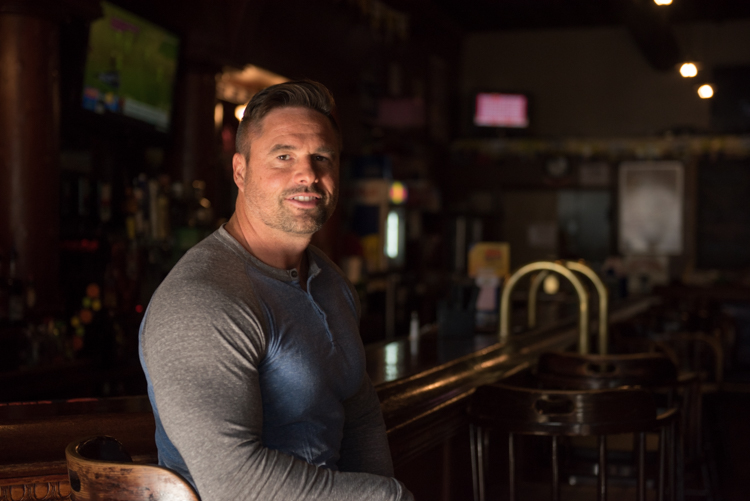
“I couldn’t live without the lake; I always knew I wanted to come back home,” Madison says, sitting on a bar stool in the middle of Racquets, a pub that debuted in 1987, opening in a more than century-old building that once housed a former eyeglass factory. “I really hoped to be part of what I saw to be a bright future in Muskegon.”
First working as a financial advisor when he returned to Muskegon in 2000 and then going into the local real estate industry, Madison decided he wanted to “make an investment in the community, and downtown in particular,” so, in 2006, he purchased Racquets.
“When I bought it, I thought downtown Muskegon was probably at its lowest point and that hopefully it would be a slow and steady climb from there,” says Madison, who has deep familial roots in Muskegon, with his grandfather, Harold Madison, working as a photographer for the Muskegon Chronicle, his uncle being the head of circulation at the newspaper, and his dad working as a press foreman.
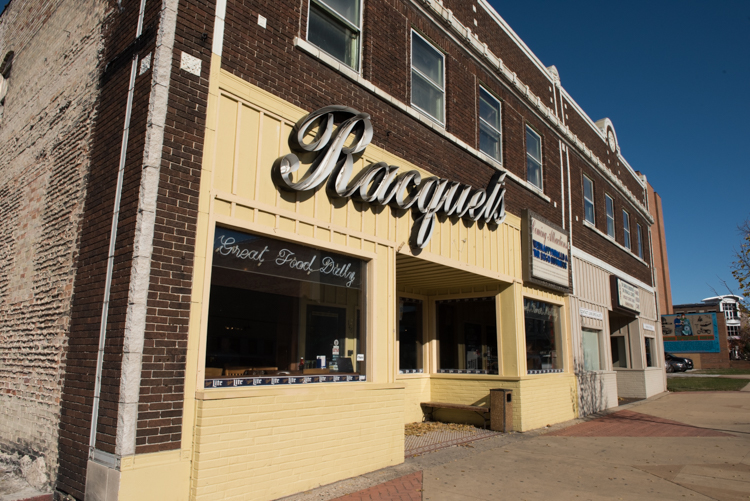
“But, two years after I bought it, the pro hockey that had been here for 50 years went away and Summer Celebration went away,” he says. “Those two events made up a large portion of the gross revenue here at Racquets; it made for a bit of a challenge and a lot of adaptation in order to survive.”
Now, however, Madison says things are changing for the better.
“I see a definite turn,” says Madison, who also founded and owns The Den, a Muskegon gym. “There are more shops, more retail. There are more events all the time. We’re working to replace the things we’ve lost. We’re growing from that; there’s more foot traffic.
“There’s energy and a positive vibe in the city, with the downtown at the heart of that,” Madison continues. “People all over the country have started to reinvest, both financially and emotionally, in their downtown communities. They understand how vital a big, vibrant, diverse downtown is. Towns can’t survive without diversity.”
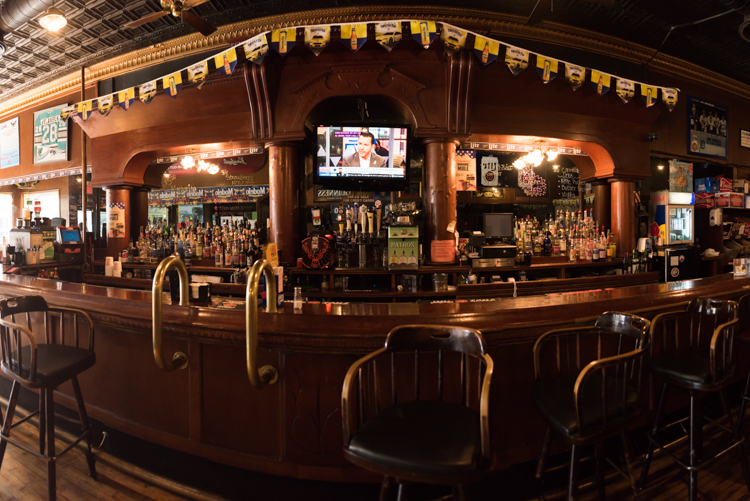
From bikers attending Rebel Road, which Madison helped to found, to sports fans and theater enthusiasts attending events at the nearby L.C. Walker Arena and Frauenthal Center, Madison says he has worked hard to ensure everyone feels comfortable at Racquets.
“It’s always been a very welcoming place; everybody has felt welcome here no matter who they are, no matter what their background is,” he says. “That’s something I pride myself on.”
As he looks to the future, both of the bar and his city, Madison plans to renovate Racquets’ space, putting in a garage door on the front of the building and adding a new patio with seating, all of which is slated to happen by this spring. For Muskegon itself, the pub owner says he hopes to see continued commercial growth.
“When it comes to new business, we want to make sure there’s a good mix of retail along with the service industry, as well as hopefully some manufacturing,” he says. “I think when you have a mix like that, you bring a diversity of people to the city, which is healthy.”
He also joins his fellow downtown bar owners in welcoming a new era of tourism in Muskegon, noting he has seen significant pedestrian traffic as the city experiences an increase in the number of tourists drawn to Muskegon’s shores, festivals, and downtown.
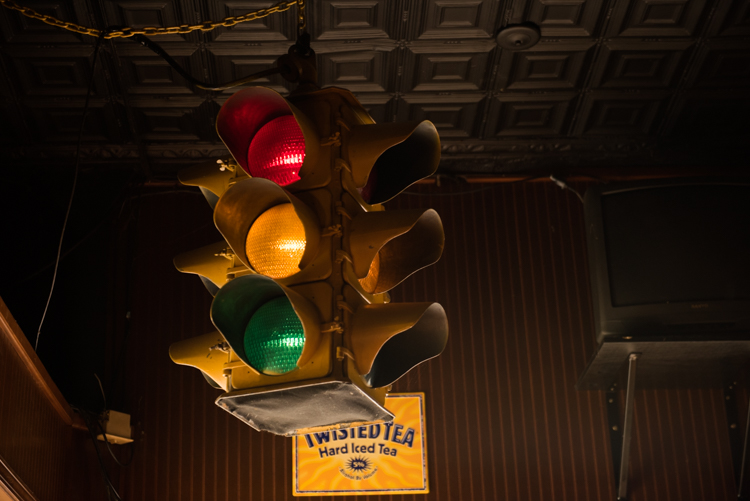
“Our town for so many years was a blue collar town. When you got out of high school, you wouldn’t need to go onto further education because there were great paying jobs you could go into,” he says. “We didn’t really need tourism; we didn’t need to share what we have. We resisted change. That mindset carries on, but with much of the industry gone, we’re now in a place where we need to learn to become accommodating and we need to learn how to ask for people to come here and give us a chance. Sometimes that means being creative.”
As Muskegon moves from an industry-heavy landscape to a more diverse economy, Madison says he’s looking forward to a bright future for his city.
“I’m just so proud of our community, and the natural resources are a big part of that,” Madison says. “I don’t think you can find more access to more natural beauty than you can find here. And you also have the great schools and the people.
“I have a lot of friends still scattered around the country, but they’re talking about coming back, especially those who have a family,” he continues. “It’s one of the best places I’ve experienced to raise a family. I have a 15-year-old daughter, and I’ve really appreciated the opportunity to raise her here.”
On deck: Slayers of tacos, masters of tequila
The next alcohol-infused venue set to hit Muskegon will be Rad Dads’ Tacos & Tequila Bar, which is slated to open in the L.C. Walker Arena by March.
“We want more than 100 tequilas” and fusion tacos that could range from Vietnamese or Irish-inspired ingredients to vegan options, Matthew Gongalski, one of Rad Dads’ three owners, says at a Community Foundation for Muskegon County event last week.The other two owners are Greg Chase and Randy Yeager.
Gongalski, one of the founders of Rebel Pies, Chase, and Yeager (all of whom call themselves the “slayers of tacos, masters of tequila”) already have gained significant community interest in the tequila and taco joint, and residents have been clamoring for their dishes: the trio sold out of food at the Taste of Muskegon event this year.
“We’ve had over 4,000 likes [on Facebook] in four months,” Gongalski says. “It’s been one of the fastest growing campaigns Muskegon has seen for a local business. We’re very excited.”
This story is part of Rapid Growth’s “On the Ground-Muskegon Lakeshore” series, which aims to amplify the voices of the community members who make up Muskegon’s waterfront neighborhoods. Over the next three months, our journalists will be embedded in the city’s lakefront communities in order to dive deeper into topics important to residents, business owners and other members of the community. To reach the editor of this series, Anna Gustafson, please email her at AKGustaf@gmail.com, or connect with her on Facebook.
Support for this series is provided by Downtown Muskegon Now, the Muskegon Business Improvement District, the Muskegon Lakeshore Chamber of Commerce, the Michigan Economic Development Corporation, Pure Muskegon, Watch Muskegon, and the Community Foundation for Muskegon County.
Photography by Jenna Swartz. To connect with Jenna, visit her website and Facebook page.


